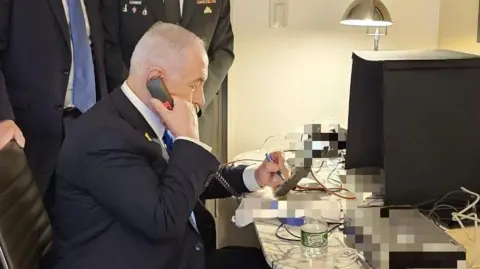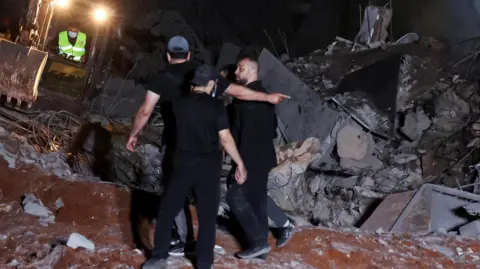 Getty Images
Getty ImagesIt is time to stop talking about the Middle East being on the brink of a much more serious war. After the devastating Israeli attack on what it said was the Hezbollah headquarters in Beirut it feels as if they’re tumbling over it.
It was a huge series of blasts, according to people who were in Beirut. A friend of mine in the city said it was the most powerful she had heard in any of Lebanon’s wars.
In the hours after the attack Israeli media reported that the Hezbollah leader Hassan Nasrallah was the target. Social media channels and TV stations were full of speculation about whether he had been in the building that was targeted and whether he had survived.
As rescue workers searched for survivors in the rubble, Hezbollah’s silence on the matter redoubled the speculation.
It was not the end of Israeli air force’s bombing missions for the day. The Israeli military announced that it was continuing to attack Hezbollah targets.
Earlier in the day there were hopes, admittedly faint ones, that Israel’s Prime Minister Benjamin Netanyahu was at least prepared to discuss a proposal for a 21-day ceasefire. It came from the US and France and was backed by Israel’s most significant Western allies.
But in a typically defiant and at times aggressive speech to the UN General Assembly in New York, Netanyahu did not talk about diplomacy.
Israel, he said, had no choice but to fight savage enemies who sought its annihilation. Hezbollah would be defeated – and there would be total victory over Hamas in Gaza, which would ensure the return of Israeli hostages.
Far from being lambs led to the slaughter – a phrase sometimes used in Israel to refer to the Nazi Holocaust – Israel, he said, was winning.
The huge attack in Beirut that occurred as he finished his speech was an even more emphatic sign that a truce in Lebanon was not on Israel’s agenda.
It seemed more than feasible that the attack was timed to follow up Mr Netanyahu’s threats that Israel could, and would, hit its enemies, wherever they were.
The Pentagon, the US defence department, said it had no advance warning from Israel about the raid.
A photo released by the prime minister’s office in Jerusalem showed him at a bank of communications equipment in what looked like his hotel in New York City. The image’s caption said it showed the moment that he authorised the raid.
 Israel Prime Minister’s Office
Israel Prime Minister’s OfficeUS Secretary of State Antony Blinken defended the policy he has worked on for months. He said there was still room for negotiation. That assertion is looking hollow.
The Americans have very few levers to use against any side. They cannot, by law, talk to Hezbollah and Hamas as they are classified as foreign terrorist organisations. With the US elections only weeks away, they are even less likely to put pressure on Israel than they have been in the last year.
Powerful voices in the Israeli government and military wanted to attack Hezbollah in the days after the Hamas attacks last October. They argued that they could deal their enemies in Lebanon a decisive blow. The Americans persuaded them not to do it, arguing that the trouble it might set off across the region offset any potential security benefit for Israel.
But in the course of the last year Netanyahu has made a habit of defying President Joe Biden’s wishes about the way Israel is fighting. Despite providing Israel with the aircraft and bombs used in the raid on Beirut, President Biden and team were spectators.
 Reuters
ReutersHis policy for the last year, as a lifelong supporter of Israel, was to try to influence Netanyahu by showing solidarity and support, delivering weapons and diplomatic protection.
Biden believed that he could persuade Netanyahu not just to change the way Israel fights – the president has said repeatedly that it is imposing too much suffering and killing too many Palestinian civilians – but to accept an American plan for the day after that rested on creating an independent Palestinian state alongside Israel.
Netanyahu rejected the idea out of hand and has ignored Joe Biden’s advice.
After the attack on Beirut, Blinken repeated his view that a combination of deterrence and diplomacy had staved off a wider war in the Middle East. But as events spiral out of US control, he is not sounding convincing.
Big decisions lie ahead. First of all, with or without Nasrallah, Hezbollah is going to have to decide how to use its remaining arsenal. Do they use try to mount a much heavier attack on Israel? If they don’t use their remaining rockets and missiles in storage, they might decide Israel will get around to destroying even more of them.
The Israelis also face highly consequential decisions. They have already talked about a ground operation against Lebanon, and while they haven’t yet mobilised all the reserves they might need, an invasion is on their agenda. Some in Lebanon believe that in a ground war Hezbollah could negate some of Israel’s military strengths.
Western diplomats, among them Israel’s staunchest allies, were hoping to calm matters, urging Israel to accept a diplomatic solution. They will now be looking at events with dismay and also a sense of powerlessness.





